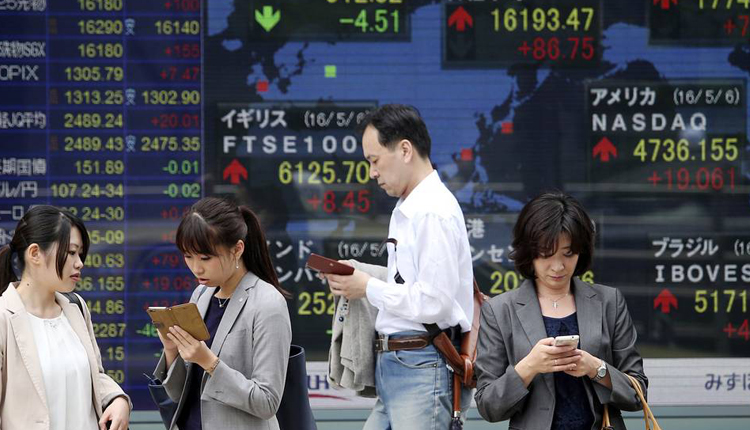Asian stocks slipped during Thursday afternoon trade, continuing a decline in markets worldwide ahead of a closely watched meeting by the Organization of the Petroleum Exporting Countries (OPEC).
Hong Kong’s Hang Seng index fell 2.62 percent in the morning session, with shares of Chinese tech heavy weight Tencent falling more than 3.6 percent.
The mainland Chinese markets, in focus due to Beijing’s trade dispute with Washington, also saw losses. The Shanghai composite slipped 1.28 percent while the Shenzhen composite shed 1.32 percent.
The moves in China came after Huawei’s CFO, Meng Wanzhou, was arrested in Canada. Meng faces extradition to the U.S., Canada’s Department of Justice said on Wednesday. That arrest could represent a new frontier in U.S.-China relations, according to the Eurasia Group.
“The arrest and extradition request by the US government represents a new and major escalation in what has been a series of US efforts to hold Chinese companies accountable for violations of US law, some dating back years,” the note said.
Another Chinese phone maker, ZTE, saw its Hong Kong-listed shares plunge 5.94 percent by the morning session’s end. Both Huawei and ZTE are restricted from selling telecoms equipment in the U.S. due to what the U.S. describes as national security concerns.
Japan’s Nikkei 225 fell 2.4 percent in the afternoon while the Topix index declined by 2.16 percent. South Korea’s Kospi also shed 1.41 percent, as shares of industry heavyweight Samsung Electronics dropped 1.93 percent.
In Australia, the ASX 200 slipped 0.52 percent in afternoon trade, with its sectors mixed. The energy subindex fell by 0.51 percent ahead of Thursday’s OPEC meeting. The Australian dollar was at $0.7223 after sliding from the $0.735 handle yesterday.
The moves Down Under came after the country’s trade surplus for the month of October missed forecasts, coming in at around 2.3 billion Australian dollars (approx $1.67 billion) instead of the expected 3.2 billion Australia dollars (approx. $2.32 billion) from a Reuters poll.
Meanwhile, futures pointed to substantial declines for the U.S. market. Dow Jones Industrial Average futures showed an implied decline of 354.07 for the index at Thursday’s open, as of 11:24 p.m. ET Wednesday.
S&P 500 and Nasdaq futures also pointed to declines. The U.S. stock markets were closed on Wednesday in honor of former president George H.W. Bush.
OPEC meets to discuss supply policy
OPEC and other top oil producing countries are set to meet later on Thursday in Austria, with a series of issues on the line.
Chief among those is the discussion surrounding crude output policy.
A combination of underestimating how much oil Iran would be able to sell, along with continued record output from the U.S., has sent prices tumbling. November posted the biggest monthly drop in a decade.
In a morning note, Ray Attrill, head of foreign exchange strategy at National Australia Bank, said the “focus has been on oil, where the preliminary meetings ahead of the formal OPEC discussions today indicate agreement to some sort of production cuts with as yet no agreement on how much (1.1mn is one figures being bandies bout).”
Ahead of the meeting, U.S. President Donald Trump called for OPEC to keep oil output “as is.”
The alliance’s policy of capping output has drawn Trump’s ire because the president wants fuel costs to fall at U.S. gas stations. Throughout the year, Trump has publicly blamed OPEC for rising oil prices and ordered the group to take measures to reduce the cost of crude.
Oil prices were lower on Thursday ahead of the anticipated OPEC meeting. The global benchmark Brent crude futures contract declined by 0.76 percent at $61.09 per barrel while U.S. crude futures slipped 0.98 percent at $52.37 per barrel.
Shares of oil-related companies in Asia were also mostly lower.
In Australia, Santos slipped 1.22 percent while Woodside Petroleum declined 0.28 percent.
The picture appeared similar in Japan, with Inpex shedding 1.33 percent and Fuji Oil falling 2.83 percent. South Korea’s S-Oil slipped 3.13 percent while SK Innovation declined by 3.52 percent. In China, Petrochina fell 1.17 percent.
US-China trade agreement
Amid confusion over what Trump and Chinese President Xi Jinping actually agreed upon at the G-20 summit in Argentina last weekend, a former governor of the People’s Bank of China told CNBC that the two economic powerhouses can make progress on their trade differences within 90 days.
“I see there is a pretty high possibility to reach some sort of success during the 90-day negotiation window,” Zhou Xiaochuan, a former PBOC governor, told CNBC’s Geoff Cutmore at the Boao Forum and Ambrosetti Meeting in Rome, Italy.
The U.S. has hit $250 billion of Chinese goods with tariffs since July, while China has retaliated by imposing duties of its own on $110 billion of American products. The trade conflict between Washington and Beijing has continued to rock global markets for much of 2018.
At a post-G-20 summit meeting in Argentina last weekend, Trump agreed not to boost tariffs on Chinese goods from 10 to 25 percent on Jan. 1, as he’d previously threatened. In exchange, the White House claimed that China would buy a “very substantial” amount of agricultural, industrial, and energy products.
Currencies
The U.S. dollar index, which tracks the greenback against a basket of its peers, was at 97.010 after seeing a high of 97.047 earlier.
The Japanese yen, widely seen as a safe-haven currency, traded at 112.67 after weakening from levels around 112.7 in the previous session.
Source: CNBC


